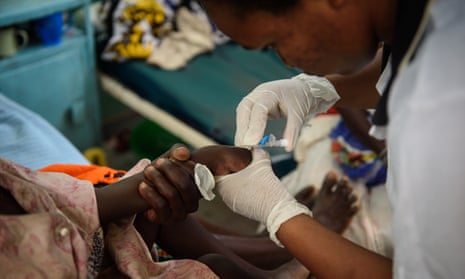Malaria will not be eradicated in the foreseeable future even though it is achievable and would save millions of lives, according to World Health Organization (WHO) experts following a three-year review.
The WHO remains committed to the “disappearance of every single malaria parasite from the face of the planet”, as it has been since the UN organisation was launched in 1948, said Dr Pedro Alonso, the director of its global malaria programme.
But the experts warned in their review that there must not be a repeat of past disasters. The WHO’s first global malaria eradication programme that lasted from 1955 until 1969 rid several countries of the disease, but was not implemented in sub-Saharan Africa, the region most badly affected.
“Falling short of eradication led to a sense of defeat, the neglect of malaria control efforts and abandonment of research into new tools and approaches,” the review stated. “Malaria came back with a vengeance; millions of deaths followed. It took decades for the world to be ready to fight back against malaria.”
Support by the Bill and Melinda Gates Foundation has led to the distribution of millions of insecticide-impregnated bednets, new drugs and a vaccine. Alonso said that, though these tools substantially reduced the numbers of malaria cases and deaths, they are not enough to rid the world of the disease that disproportionately kills small children and pregnant women.
The review was commissioned in 2016 to investigate how eradication could be achieved. It found that there are no biological or environmental barriers to eradication and that global development will probably mean less malaria in the future.
“However, even with our most optimistic scenarios and projections, we face an unavoidable fact. Using current tools, we will still have 11 million cases of malaria in Africa in 2050,” said the review. “In these circumstances, it is impossible to either set a target date for malaria eradication, formulate a reliable operational plan for malaria eradication or to give it a price tag.”
Drug resistance in the malaria parasite has made it harder, but even without that, the bednets and the new vaccine are only 40% effective, said Alonso. “Smallpox had a very safe, highly effective vaccine,” he said. “So does polio, which is close to eradication.
“We will always fall short of eradication because our tools are imperfect,. They have allowed us to make huge progress over the last 15 years, but they are far from being a silver bullet in any shape or form.
“Our priority now should be to establish the foundation for a successful future eradication effort while guarding against the risk of failure that would lead to the waste of huge sums of money, frustrate all those involved, national governments and malaria experts alike, and cause a lack of confidence in the global health community’s ability to ever rid the world of this disease,” said the report.
Progress has stalled in the last two years in efforts to meet the target of 90% reduction in cases by 2030, it says. It calls for a major investment of $34bn (£28bn) to scale up current interventions over the next 11 years and strong political leadership to ensure affordable healthcare in affected countries. Better data on malaria transmission is also needed and better tools to control mosquitoes and protect and treat people in malarial regions.
